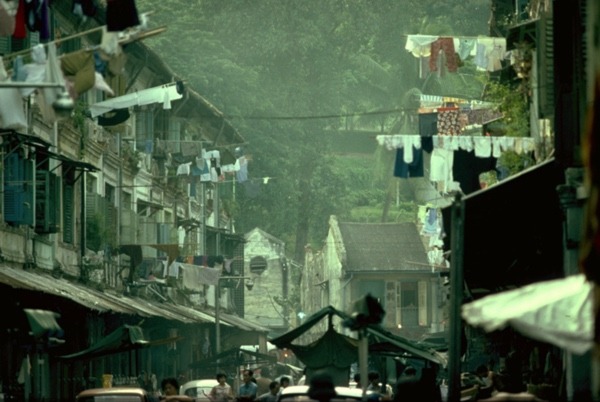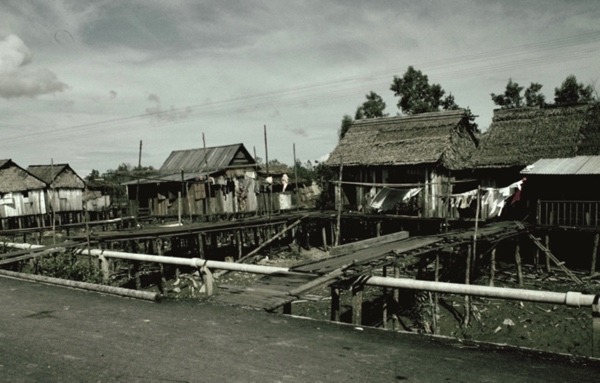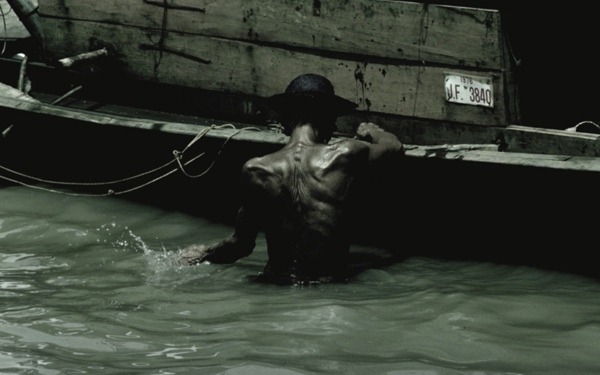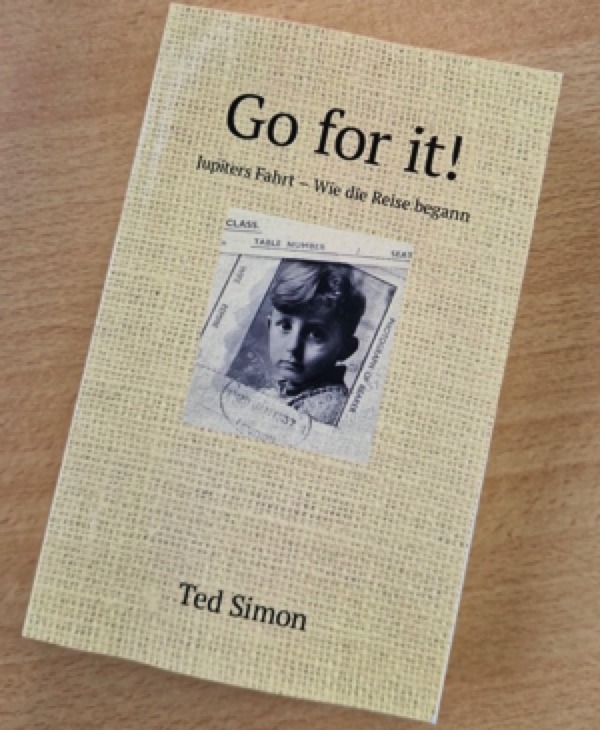Having left Perth on the Kota Bali after six months in Australia, I am now in Singapore. Still with Carol, but we have agreed to separate in Malaysia. I have decided to lighten my load. Let me remind you that I have transcribed these notes exactly as I wrote them at the time. Sometimes I surprise myself.
April 27th
Make up a parcel for England. Contains my clothes, sweater, boots: Carol’s dress, shorts, shirt, gloves, undies. Carved wombat, shock absorber, stator [which I later profoundly regretted] auto advance coil, pump, books, Carol’s journal. Cost S$ 6.5 i.e. £6.
Every day we develop the theme of our relationship as revealed by the decision to separate. Only touches of bitterness and grief now. Meanwhile, curiously enough, the French couple next door at the hotel are going through intense bickering and were supposed to have left this morning for Colombo.
We ride around island and drink root beer – A&W
April 28th
Only exit papers to get today. Traffic and fumes becoming intolerable. At night visit the famous Bugis street – doesn’t resemble in any way what I remember seeing in pictures or hearing about. A great array of tables with white cloths laid out in the street and an adjoining square – almost all occupied by parties of Western tourists. The “girls” – transvestites – appear very heavily made up and bewigged. Evidently some of them work for tourist agencies and are paid to sit and chat with a group. For the rest, tourists have virtually nothing but an open-air restaurant at which they can look at each other. There is not even any music. And the prices are naturally high, but they seem happy enough with it. Menus are framed and placed on tables. Nothing under S$8.
Today Carol bought an Olympus automatic.

Old Singapore as I saw it
29th, Thursday
Breakfast as usual in narrow café off Bencoolen street. An old Chinaman, with head like Ho Chi Minh’s, is sitting across from me reading a newspaper. Then I see that he isn’t sitting – he’s left his sandals on the floor and is crouching on the chair – but his legs are folded so perfectly that he’s like a vase on its pedestal – perfect feet. Made an unsuccessful attempt to find a shoulder bag – get water bottle instead – and away to Malaysia. No questions or problem at frontier. Johore is a shapeless town. No way to find our tourist contact. At rest house we are referred to the rest house in Pontian. At first, the road to Kuala Lumpur is very ugly – then turn off left to Pontian, and lost among shady green rubber plantations (albeit full of mosquitoes). The girl behind the counter in Johore rest house has full lips, and it suddenly strikes me that her upper lip is the perfect model of a pagoda roof, in all its proportions.
A night at Pontian rest house $15 – $3 more than list price. Air Con but roars like a monster. Lovely view out to sea – small island – delicate wooden jetty widening in three places to make places to sit under cover of rush roofs.
Indian Malay dressed in planter’s gear addresses me like an old-fashioned sergeant-major – upper class cockney. He’s very drunk.
[We went to a restaurant and got to know and like the proprietor, Ambak Jaya, and his wife.]
April 30th
Invited to visit Mr. Jaya’s Garden. At 8.30 we are outside his restaurant, but door and red shutters closed. He is still asleep, on a table.
At 9.0 we set off – in two trishaws – about a mile inland to a five-acre plot with wooden shack and many trees. They are durian, mangostin, coconut, mango and various other fruits which Carol has noted, including one which is probably bread fruit and has to be held in a woven rush net to prevent it dropping too soon. Has some limon trees from Ipoh, a fruit which grows to the size of a melon, but smells like lemon. It is essential for every Chinaman’s New Year ritual, and therefore very profitable to grow once a year.
Afterwards we sit down to a display of sweet meats – balls, pasties, very doughy – and then coconut and coffee. It’s very hot. I sweat profusely. Insist on pedaling the trishaw back with the two men in it. It’s less arduous than I thought, though a bit wobbly at first. The owner is in a great state of nervous laughter as we swerve from one verge of the path to the other, but I manage fine until we meet a group in the road who won’t move. There are no brakes and I misjudge the outer width of the trishaw and clout somebody’s motorbike exhaust – but nobody minds too much.
Later we ride out to Kukup – where some very small, poor shacks sit on stilts in the water.

Kukup
See a man up to his neck – old with reddish brown skin, scrubbing the hull of his boat.

Meet a rubber planter. 25 years in Malaya (Scots) and his girl friend from Singapore. He had read about me in the Sunday Times. Nice gentle man, blue eyes, but bloodshot, and corpulent.
2000lbs an acre of latex per annum is a good yield. Compared with post-war best of 600lbs.
Stopped at sago mill on way back, by a river. Lengths of palm chopped off and fed into a masher. Then water washes out the sago in a revolving pipe with combs. People bring trunks on bikes and carry away sacks full.
May 1st (my birthday)
[We have now moved into Jaya’s house above the restaurant.]
To market with Jaya’s wife to buy fish for birthday lunch. Heavy rain today. Market full of strange fish – a lot of long thin silvery fish with forked tail – reminds me of a knife blade. Also big, plump pinkish fish and reddish ones which might be snapper, though cheap. We buy small triangular fish called Ikan Bauer – supposed to be very good.
There’s a chicken plucking machine, like a spin dryer with rubber knobs – water rushes in and carries off the feathers. First, bird is dipped in boiling water.
At 4pm my birthday lunch is prepared and brought up to the first floor landing outside the rooms. A big platter of noodles, another of vegetables, another of cucumber and salad, a plate of roast chicken and goat, and the three beautiful fish in sweet and sour sauce. Ambak and the three children come up to eat, bringing a great heap of presents gaily wrapped – the monkey [They gave me a stuffed monkey] a sarong, two towels and a box of pretzels. All carefully graded from father to nephew.
That evening we walked together along the main road north out of town and back, pausing to wonder at a chorus of bull frogs – so loud, almost harmonious, reminding me of the fog horns in San Francisco Bay.
Carol wanted to buy me a drink. We went to the rest house bar, where that same fellow who addressed me the first time was still drinking beer, tho’ he seemed less drunk now. He insisted on buying round after round.
“You’ve got to darn well drink up. Karim, another of the same, and make it snappy. So, you’re from England. Well, that’s a jolly fine place. I was at Sandhurst myself. Got a brother in Southall. He’s an army captain.”
He’s from a camp near Alor Star [a border town in Thailand]. He’s here to drink away his leave, with his cousin, the police inspector of Pontian. He infers that there are quite a few cases pending against Ambak at the police HQ.
Karim, a soft-spoken Muslim with a wide, helpless smile, is high on ganja and plays up to the captain’s mock severity. Meanwhile I’m getting quite merry and loquacious too. Karim remembers that the FA cup final is showing. We dash to the kitchen TV just in time to see Southampton score the only goal against Manchester United a few minutes before time. Karim considers me to be a naturally lucky person, and therefore wise, and consults me about his unrequited love. I say foolish things to him but feel good. The Capt. insists that I visit him at Alor Star. Drink more brandy and beer. He drives us to the hotel, very giddy, in the inspector’s car. He leaves tomorrow.
That’s all for now.
I know that some of you following me are German, so it may interest you to know that my autobiography has just been translated into German (but with a different title, in English. Apparently it was impossible to boil the canary in German).
It will be available at the MRT in Gieboldehausen at the end of August and I will be there to sign copies.

Perth, Mid-April
Before leaving the country I wrote this rather harsh assessment:
Australian life does seem to have a dreamlike quality. Life seems to pass in a daze, as though one were just going through the motions. People do work, but never show the effect of it, and this underlying assumption of imperturbability seems to run through even their most drunken or excited moments. There is no real intensity and so boisterousness, un-warmed by real emotion, has a hard and cruel feeling. One must assume that Australians protect themselves from self-awareness, could not bear to know what they feel and so prefer to feel nothing. Better to amble slowly in the sun, in singlet and thongs, a stubby – in its cooler – in hand, drawn by the ever-present aroma of barbecued meat, like a Bisto kid grown up in paradise.
The Passage to Singapore
The Kota Bali was a fairly small vessel. In its upper decks it was a cruise ship. Down below, it was an animal transporter, taking live animals to the halal butchers in Malaysia. To my jaundiced eye it was difficult to distinguish between the people upstairs and the sheep below.
But what really occupied my mind and tore me apart was the thought of the pain I knew I would cause Carol, because it had become clear to me that if I were to write the book I’d had in mind for two and a half years, I must finish the journey alone. It was a terrible dilemma – Carol or the book. There was no question that we loved each other, completely. How could I expect her to understand? That I would let a book endanger our relationship? That having invited her to join me, I could now abandon her? So I wrote:
When there are two people, at least half of what happens concerns the other, or is modified by the other’s presence. Travelling in concert somehow blunts the sense of new, strange experience. If I were writing about two people travelling together that’s a challenge I can accept. But I cannot introduce a second character at this stage. There’s not enough weight or interest to absorb such a change of parameters. But even more than that I have to admit the intensity of the experience is much lower á deux. More comfort, more indulgence – a microcosm of marriage.
The passage to Singapore is fraught with the burden of responsibility for bringing down the towering expectations in which it seems to me Carol has chosen to house her love for me. Every day now it seems a new storey or wing is added to this unstable structure – in French lessons, references to details in the future of the journey and most of all in omissions of remarks, of which I am most conscious. The impending doom is so oppressive but still I can’t bring myself to make the first, simple remark which will bring it all crashing down. It must fall, it seems, of its own volition.
The atmosphere on the ship is crude and harsh. Australian couples who by their mere presence, let alone their references to “your wife” emphasise the wrongness of our situation. For two people to insist on their own forms of truth they must be entirely open to each other, or the uneasy wriggling under misguided interrogations deepens the dilemma.
“When did you start the journey?” they ask Carol. “What will you do afterwards? Are you going to live in France or in America?”
None of our answers mean anything to them. If they had the faintest concept of a life less surely conceived than their own they could not have the temerity to ask so abruptly. And certainly, the first vague, evasive reply would give some hint that perhaps a moment’s thought should be given before the next, inevitable line of the catechism. But no, inexorably they continue. “Are you going to have kids?”
The aroma of beer rolls down the decks every time the saloon doors are opened. The ladies, it’s said, change their frocks four times a day.
Charles and Arthur Booth, bull shippers, sheep shippers, drear and dreadful men.
We are both deeply depressed by the huge chunk of our resources we have had to break off for this miserable experience – to be exposed finally to a parody of everything that was worst about Australia – to be taken through a gale – to be denied the few visual pleasures of the Indonesian coast we might have enjoyed – by a maudlin and waspish Welsh captain whose first words to me were so ridiculous as to be beneath contempt. [Sadly, I didn’t write them down.]
Watching the horizon one day, at evening, so definite a line stretching round the ship below a wash of orange light, it struck me that it was quite obviously circular, and if the horizon is a circle then clearly the surface must drop away on all sides and at an equal decline. Given that the same picture presents itself at all times on the open sea when the horizons are clear, the inference must be that the earth is a globe. It is so much more understandable to me now how Columbus came to this conclusion – and that he cannot have been the only one, but perhaps the one who could least restrain the urge to demonstrate it, whatever the peril.
Passed Christmas Island on Easter Monday – a tree-covered rock rising sheer from the water, with waves breaking on it. A mine of phosphate rock for Western Australia, and little else it seems, but 4000 people.
Next morning we pass by Java Head, but light is poor and hazy and can only distinguish low lying masses on either side. Am sad at having to come this way. Would have been so much better and cheaper to have followed logical route of Darwin – Bali, etc. But there seemed no other way out. [Darwin had been destroyed by a hurricane.]
“We’re on the wrong trip,” I said to Carol. “We’d better get back on the right one soon.” It was as close as I’d dared come to saying it all. Already I was suffering from a sore throat, and my body was preparing to act out my emotional predicament. But Carol took it up and soon the whole edifice lay in ruins about us, with Carol wandering about the wreckage like an earthquake survivor, stunned, howling with rage and grief, cursing me, herself, fate, everything.
So they went on, the storms and lulls, through our last day on board, through the first day in Singapore of chasing papers, hotels, contacts, money. And the second day of more papers and unloading until I could at last go to bed and let the fever break over me. Eventually, as the fever went so did Carol’s blackness, and at last we seemed to be clean with each other again.
“Did you really have to take us through all that?” she asks, unsure of herself. I thought so, had been thinking so, never feeling it right to stop the grief halfway.
[We agreed finally to go our separate ways when we got to the Cameron Highlands, in Malaysia.]
Singapore, April 22nd
Arrived 8am. Took bus from Jurong into city. There, hassled with shipping clerk about import permits, then found hotel on Bencoolen. Back to ship in evening to get documents and few things, then to hotel, struggling on foot part of the way because of difficulties with buses and one-way systems.

A long-vanished sight. Sampans in Singapore
April 23rd
After a bad night, still feverish, to the AA for import permit, then to ship for bike, and at last to hotel with all gear, to bed, to sweat and eventually in night, to break the fever.
April 24th
The infamous lunch engagement with Mr. “Polly” whose sloppy conduct I can’t forgive. [I suspect he was a shipping agent.] Call Sunday Times at night.
April 25th
Walk around thieves’ market – nothing much there really except atmosphere – and ride round the island in the afternoon.
April 26th
Nobody at ST to talk to except Anglo-Asian editorial manager, Mr. Jackson, who is polite and suggests features for the Sundays.
Mr. “Polly” compounds his infamy. Shipping from Penang to Madras comes to too much. Peter Harland is suspected of having appendicitis. Indian High Commission makes ominous noises about visas, and I become profoundly depressed about money. Have only £100 left.
At last, cut the knot and call Tony Morgan for $1000. [Tony was a friend in England who had kept some money for me.] He promises to send it to NatCit, Penang. He sounds pretty demoralised. “You certainly left at the right time.” [Britain, under Harold Wilson, was going through a dark time, literally, with power cuts and strikes.]
Feel much better and cross the road to join Carol on an evening harbour cruise. Nothing to see, but it makes an hour away from the traffic. Singapore Tourist Board has erected a stone carving of a “Merlion” on a pier by the bridge and unashamedly announces that this is a foremost tourist attraction in Singapore.
After harbour we wait out a torrent of rain then go to Telek Ayer street restaurant across the river.







